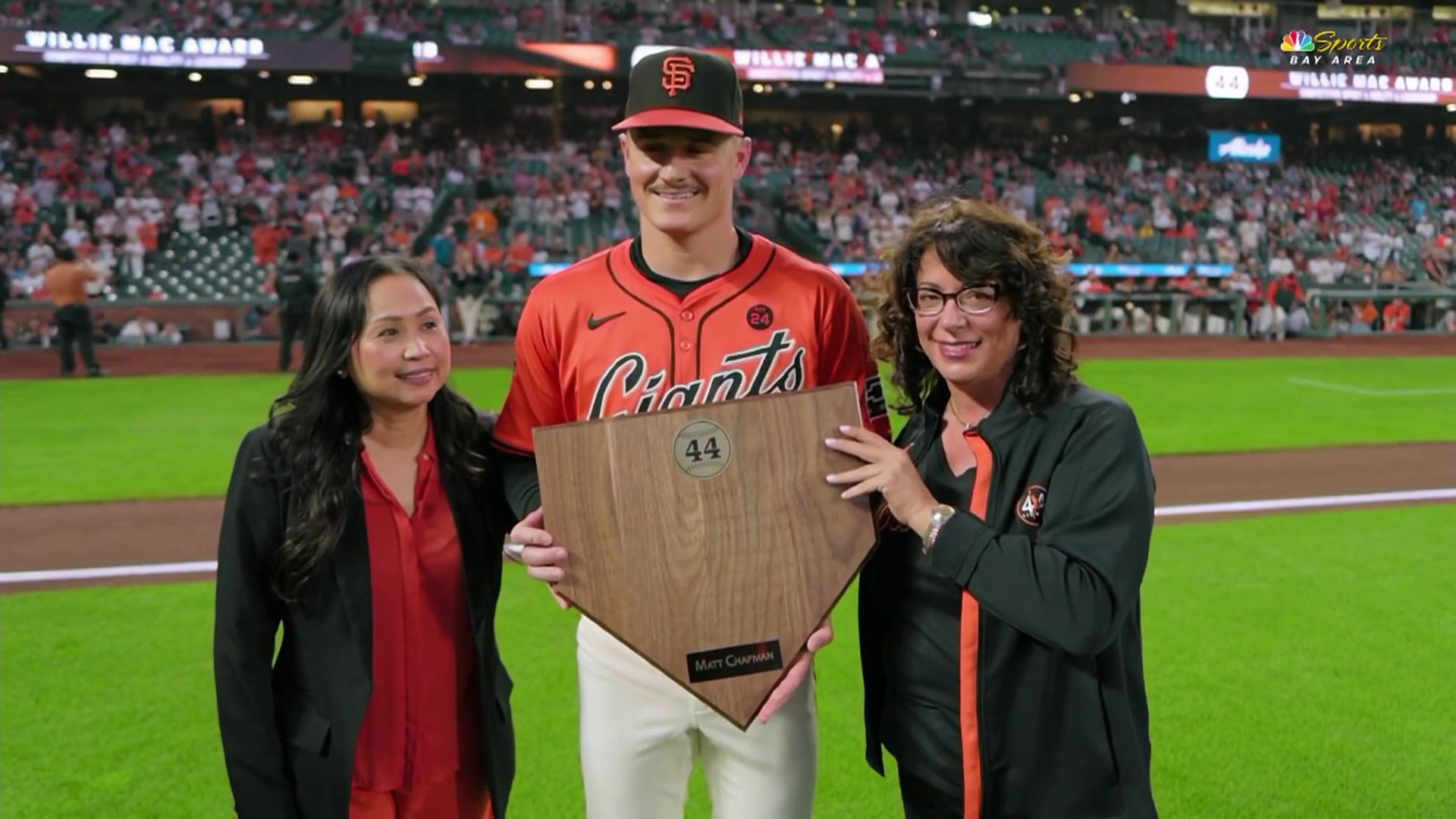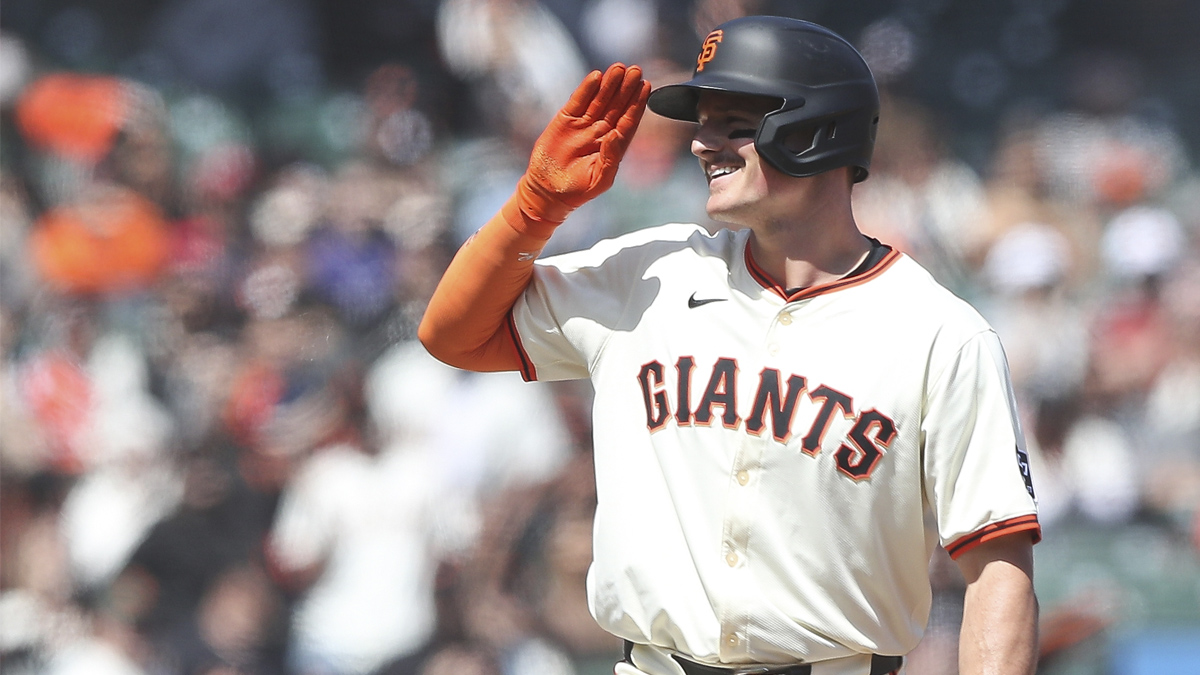SAN FRANCISCO -- It was a meaningless game in a disappointing season for both teams, and by the time the pitches were thrown, you would have had to start counting seagulls as paid attendees to get to five figures remaining at Oracle Park.
But it was another big moment for the man who crouched down into his unique delivery and threw the pitches.
With two runners in scoring position and the Giants nursing a four-run lead in the eighth inning of a late-September game against the Colorado Rockies, Tyler Rogers threw his frisbee slider up and in to Ryan McMahon and got such a hard whiff that McMahon stepped on the plate with his follow-through.
Stay in the game with the latest updates on your beloved Bay Area and California sports teams! Sign up here for our All Access Daily newsletter.
Rogers then delivered another two-strike slider to C.J. Cron, who waved feebly at a pitch that ended up in the other batter's box.
The appearance was Rogers' fourth straight against the Rockies, and if there was any advantage to familiarity, it didn't show for their two most dangerous hitters. A day later, Rogers noted that putting up another zero against a team he had seen that often over a short span felt especially rewarding.
"It's funny, that was the first question I got when I got called up," he said. "So I've kind of always had a little chip on my shoulder for that, so that felt good and it was kind of in the back of my mind after that Rockies series."
Relievers always will live an unfair existence. They trend on Twitter when they have a rough outing, but nobody notices when they run off a dozen scoreless innings in a row. Rogers has to deal with one more hurdle, the constant desire of many to point to familiarity whenever he has a bad outing.
San Francisco Giants
Of course Rogers is getting hit, they say. He is a unicorn, but eventually the world's best hitters will figure him out.
You didn't have to search hard to find those sentiments when Rogers took a 7.41 ERA into the clubhouse after a May appearance that ended with seven earned runs on his line. He spent months whittling that number down, but with every stumble, the noise would pick back up. It never did within the walls of the clubhouse, though.
Manager Gabe Kapler is generally positive when discussing his players publicly, but the smile was a bit wider whenever he got to talk about Rogers late in the year.
"I don't think there was ever a moment where any of us on the major league coaching staff or any of his teammates doubted Tyler's ability to be an important piece of our bullpen," he said.
Kapler did not shut out the noise fully when the Giants' season began to turn.
Rogers wasn't getting his normal results, and his manager was well aware of the grumbles outside the walls of the clubhouse, but Kapler never wavered in his faith. The Giants released Jake McGee and Dominic Leone and banished Zack Littell to the minors, but Rogers made 68 appearances and finished the year back in a high-leverage role.
With John Brebbia spending so much time as an opener in September, Rogers often slipped into the seventh or eighth ahead of closer Camilo Doval, and he looked comfortable. Rogers threw 16 2/3 scoreless innings over his final 11 appearances and didn't allow a run after Aug. 30. He finished the season with a 3.57 ERA and 3.44 FIP.
The ERA is higher than it was the previous year, when Rogers merited All-Star consideration, but otherwise his season looked very, well, Tyler Rogers-ish. His strikeout and homer rates were in line with previous seasons, along with his expected batting average and hard-hit rate. Rogers finished second among all big league pitchers in average exit velocity allowed.
Giants coaches consistently brought those numbers to Rogers during the down times, reminding him that he was the same pitcher with one exception -- a walk rate that nearly doubled but still wasn't that high. Rogers didn't stress too much about that. Hitters were more selective against him this year, but he didn't feel like his command was notably worse.
"You're always trying to get better command," he said. "It's like golf, like trying to hit more fairways off the tee. You always want more fairways off the tee."
Kapler noted that occasional command issues are the norm for just about every reliever, but he didn't find anything else in the numbers this year that concerned him. He said he understood the criticism in the middle of the season because Rogers "wasn't without his struggles and some of those struggles he was responsible for," but the Giants have as much faith in Rogers as they ever have.
"I didn't see anything wildly off when he was going through those struggles," Kapler said late in the season. "I see a pretty similar version of him, perhaps a more confident version. That confidence really makes a difference at the margins and that's probably why we're seeing the success we're seeing right now."
Rogers shows less emotion on the field than just about everyone on the roster, but he quickly pumped his first after striking out Cron to get out of that late-September jam. That gave him six scoreless innings in September against a team that has seen him more times -- 27 -- than any other opponent the last four years.
Rogers' strong September and October included four scoreless innings against a Los Angeles Dodgers lineup that has seen him 24 times and gave him some trouble in 2021, along with good outings against the Arizona Diamondbacks and San Diego Padres.
RELATED: Why Zaidi sees role for Longo on Giants' 2023 roster
The Giants will not play their NL West opponents quite as often with next year's schedule changes, but they still will see each 14 times, and Rogers will be counted on when things get tight. He is arbitration-eligible for the first time and, while he didn't put up quite the platform year he hoped, he did show some new versatility by briefly succeeding in a long-relief role as the staff looked to get him back on track.
As he moved back into a high-leverage role, Rogers stood in front of his locker at Oracle Park and tried to sum up the roller coaster ride. He had been asked about an "up-and-down season" that was ending on a high note, and he thought about the words for a few moments.
"At the end of the day, an up-and-down season, isn't that just a normal season?" he asked. "That's baseball, and that's why you play 162 games."


